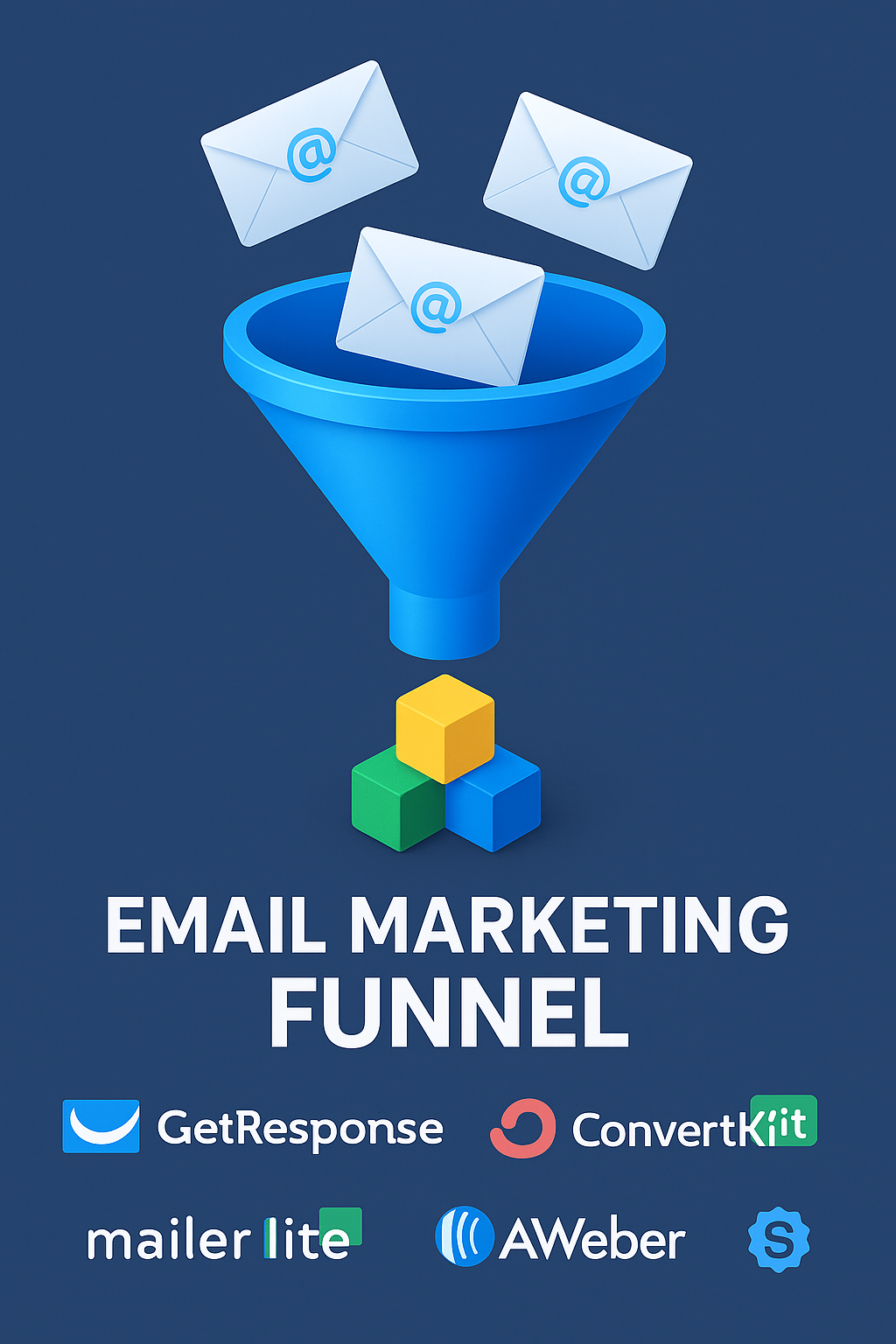email funnel automation tools

-
Table of Contents
“Streamlining Success: Your Pathway to Efficient Email Marketing with Funnel Automation Tools.”
Email funnel automation tools are advanced software solutions designed to automate and streamline the process of email marketing. These tools help businesses to nurture leads, engage with customers, and drive conversions through a series of automated emails. They allow marketers to create, schedule, and send personalized emails to their target audience based on their interactions with the brand. The automation of this process not only saves time and resources but also enhances the effectiveness of email marketing campaigns by delivering the right message to the right person at the right time.
Exploring the Top Email Funnel Automation Tools for Businesses
Email funnel automation tools have become an indispensable part of modern business operations. These tools are designed to streamline the process of managing and optimizing email marketing campaigns, thereby saving businesses valuable time and resources. They automate the process of sending targeted emails to potential customers at different stages of the sales funnel, ensuring that the right message reaches the right person at the right time.
One of the most popular email funnel automation tools is MailChimp. Known for its user-friendly interface and robust features, MailChimp allows businesses to create, manage, and track email campaigns with ease. It offers a variety of pre-designed templates, making it easy for businesses to design professional-looking emails. Additionally, MailChimp’s advanced analytics feature provides valuable insights into campaign performance, helping businesses make data-driven decisions.
Another top-rated tool is ActiveCampaign. This platform stands out for its advanced automation capabilities, which allow businesses to create complex, multi-step email campaigns. With ActiveCampaign, businesses can automate the entire customer journey, from initial contact to final sale. The platform also offers CRM integration, making it easy to manage customer relationships and track interactions.
Constant Contact is another highly recommended tool, particularly for small businesses. It offers a wide range of features, including email automation, contact management, and reporting. Constant Contact also provides a library of customizable email templates, making it easy for businesses to create engaging emails. Moreover, its real-time reporting feature allows businesses to track the performance of their email campaigns and make necessary adjustments.
GetResponse is also worth mentioning. This tool is known for its intuitive interface and comprehensive features, which include email automation, landing page creation, and webinar hosting. GetResponse also offers advanced segmentation options, allowing businesses to target specific groups of customers with personalized messages. Its detailed analytics feature provides insights into campaign performance, helping businesses optimize their email marketing efforts.
Lastly, there’s Drip. This tool is specifically designed for eCommerce businesses, offering features like customer tracking, personalized product recommendations, and abandoned cart emails. Drip’s automation capabilities allow businesses to send targeted emails based on customer behavior, ensuring that potential customers receive relevant messages that encourage them to make a purchase.
While these are some of the top email funnel automation tools, it’s important to note that the best tool for a business depends on its specific needs and goals. Factors to consider when choosing a tool include its features, ease of use, integration capabilities, and cost. Businesses should also consider the tool’s scalability, as their needs may change as they grow.
In conclusion, email funnel automation tools are a powerful asset for businesses looking to optimize their email marketing efforts. By automating the process of sending targeted emails, these tools can help businesses reach potential customers at the right time, with the right message. Whether a business is small or large, there’s an email funnel automation tool out there that can meet its needs. With the right tool, businesses can save time, improve their marketing efficiency, and ultimately, drive more sales.
Maximizing Efficiency: A Review of Leading Email Funnel Automation Tools

Maximizing efficiency in email marketing is a crucial aspect of any successful digital marketing strategy. With the advent of technology, businesses are now leveraging email funnel automation tools to streamline their marketing efforts, save time, and increase their return on investment. These tools not only automate the process of sending emails but also help in segmenting the audience, tracking performance, and optimizing campaigns for better results.
One of the leading email funnel automation tools in the market today is MailChimp. Known for its user-friendly interface and robust features, MailChimp allows businesses to automate their entire email marketing process. From creating and scheduling emails to segmenting audiences based on their behavior and preferences, MailChimp offers a comprehensive solution for businesses of all sizes. Moreover, its advanced analytics feature provides valuable insights into campaign performance, enabling businesses to make data-driven decisions and improve their marketing strategies.
Transitioning to another tool that has been making waves in the industry, ActiveCampaign is renowned for its advanced automation capabilities. It offers a unique feature called ‘automation maps’ that visually represents the automation process, making it easier for businesses to understand and manage their email funnels. Additionally, ActiveCampaign provides a CRM system integrated with the email marketing platform, allowing businesses to manage their customer relationships more effectively. Its detailed reporting feature also helps businesses track their campaign performance and identify areas for improvement.
On the other hand, ConvertKit is a tool specifically designed for bloggers, podcasters, and other content creators. It offers a simple yet powerful platform for managing email marketing campaigns. One of its standout features is the ‘visual automation builder’ that allows users to create and customize their email funnels with ease. ConvertKit also offers seamless integration with other popular tools like WordPress, Shopify, and Zapier, making it a versatile choice for content creators.
Another noteworthy tool is Drip, which is particularly beneficial for e-commerce businesses. Drip offers a range of features tailored for e-commerce, including personalized product recommendations, abandoned cart reminders, and customer loyalty rewards. Its ‘visual workflow builder’ allows businesses to design and automate their email funnels, while its advanced segmentation feature enables them to target their audience more effectively.
Lastly, SendinBlue is a tool that combines email marketing, SMS marketing, and live chat in one platform. It offers a range of automation features, including transactional emails, autoresponders, and audience segmentation. SendinBlue also provides real-time analytics, allowing businesses to monitor their campaign performance and make necessary adjustments.
In conclusion, email funnel automation tools are an indispensable part of modern digital marketing strategies. They not only automate the tedious process of sending emails but also provide valuable insights into campaign performance, helping businesses optimize their strategies for better results. Whether it’s MailChimp’s user-friendly interface, ActiveCampaign’s advanced automation capabilities, ConvertKit’s simplicity, Drip’s e-commerce features, or SendinBlue’s multi-channel approach, each tool offers unique benefits that can help businesses maximize their email marketing efficiency. Therefore, businesses should carefully evaluate their needs and choose a tool that best fits their requirements.
The Role of Email Funnel Automation Tools in Streamlining Marketing Strategies
Email funnel automation tools have emerged as a game-changer in the realm of digital marketing. They play a pivotal role in streamlining marketing strategies, enabling businesses to engage with their customers more effectively and efficiently. This article delves into the role of these tools in enhancing marketing strategies.
Email funnel automation tools are essentially software applications that automate the process of sending targeted, personalized emails to customers at different stages of the sales funnel. The sales funnel, a model that illustrates the customer journey from the initial contact to the final purchase, is a critical component of any marketing strategy. It helps businesses understand and address the unique needs and preferences of their customers at each stage of the buying process.
The role of email funnel automation tools in streamlining marketing strategies cannot be overstated. These tools automate the tedious and time-consuming task of manually sending emails to customers, freeing up valuable time for businesses to focus on other important aspects of their operations. They also ensure that the right message is delivered to the right person at the right time, thereby increasing the chances of conversion and customer retention.
One of the key benefits of email funnel automation tools is their ability to segment customers based on various criteria such as their behavior, preferences, and previous interactions with the business. This allows businesses to send highly personalized emails that resonate with the customers, leading to higher engagement and conversion rates. Moreover, these tools provide valuable insights into the effectiveness of the email campaigns, enabling businesses to tweak their strategies based on real-time data.
Another significant advantage of email funnel automation tools is their ability to nurture leads. Not all customers who enter the sales funnel are ready to make a purchase. Some may need more information or reassurance before they are willing to part with their money. Email funnel automation tools allow businesses to stay in touch with these leads, providing them with relevant content and offers that gradually move them towards the purchase decision.
Furthermore, email funnel automation tools help in reducing cart abandonment rates, a common issue faced by e-commerce businesses. By sending timely and relevant reminders to customers who have left items in their shopping carts, these tools can significantly increase the chances of completing the sale.
In addition to streamlining marketing strategies, email funnel automation tools also contribute to improving customer experience. By ensuring consistent and personalized communication, these tools help in building strong relationships with customers, fostering loyalty and trust. They also enable businesses to promptly respond to customer queries and complaints, thereby enhancing customer satisfaction and retention.
In conclusion, email funnel automation tools play an indispensable role in streamlining marketing strategies. They automate the process of sending targeted emails, segment customers for personalized communication, nurture leads, reduce cart abandonment rates, and improve customer experience. By leveraging these tools, businesses can not only save time and resources but also significantly enhance their marketing effectiveness and customer engagement. Therefore, investing in a robust email funnel automation tool is a strategic decision that can yield substantial returns in the long run.
Conclusion
Email funnel automation tools are highly beneficial for businesses as they streamline the process of nurturing leads and converting them into customers. They allow for personalized communication, improved efficiency, and increased sales. However, their effectiveness largely depends on the quality of the content and the understanding of the target audience. Despite this, they are an essential component of a successful digital marketing strategy.










